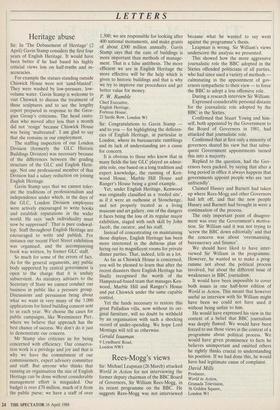LETTERS Heritage abuse
Sir: In 'The Debasement of Heritage' (2 April) Gavin Stamp considers the first four years of English Heritage. It would have been better if he had based his highly criticial views less on half-truths and in- accuracies.
For example the statues standing outside Chiswick House were not `sand-blasted'. They were washed by low-pressure, low- volume water. Gavin Stamp is welcome to visit Chiswick to discuss the treatment of these sculptures and to see the lengthy report prepared in response to the Geor- gian Group's criticisms. The head custo- dian who moved after less than a month did not 'resign' because Chiswick House was being 'maltreated'. I am glad to say that she remains in our employment.
The staffing inspection of our London Division (formerly the GLC Historic Buildings Division) was necessary because of the differences between the grading structure of the GLC and English Herit- age. Not one professional member of that Division had a salary reduction on joining English Heritage.
Gavin Stamp says that we cannot toler- ate the traditions of professionalism and independence under which, in the days of the GLC, London Division employees were actively encouraged to write books and establish reputations in the wider world. He says 'such individuality must now be suppressed'. That is pure codswal- lop. Staff throughout English Heritage are encouraged to write and publish. For instance our recent Fleet Street exhibition was organised, and the accompanying book was written, by former GLC staff.
So much for some of the errors of fact. As for the general arguments, any public body supported by central government is open to the charge that it is unduly subservient. As statutory advisers to the Secretary of State we cannot conduct our business in public like a pressure group. Discussions and persuasion bring about what we want in very many of the 3,000 applications for listed building consent sent to us each year. We choose the cases for public campaigns, like Westminster Pier, where we believe that approach has the best chance of success. We don't do it just to demonstrate our concern.
Mr Stamp also criticises us for being concerned with efficiency. Our conserva- tion work is a privilege and joy and that is why we have the commitment of our commissioners, expert advisory committee and staff. But anyone who thinks that running an organisation the size of English Heritage can be done without considerable management effort is misguided. Our budget is over £70 million, much of it from the public purse; we have a staff of over 1,500; we are responsible for looking after 400 national monuments, and make grants of about £300 million annually. Gavin Stamp says that the care of buildings is more important than methods of manage- ment. That is a false antithesis. The more efficient we are in English Heritage the more effective will be the help which is given to historic buildings and that is why we try to improve our procedures and get better value for money.
P. W. Rumble
Chief Executive, English Heritage, Fortress House,
23 Savile Row, London W1






























































 Previous page
Previous page